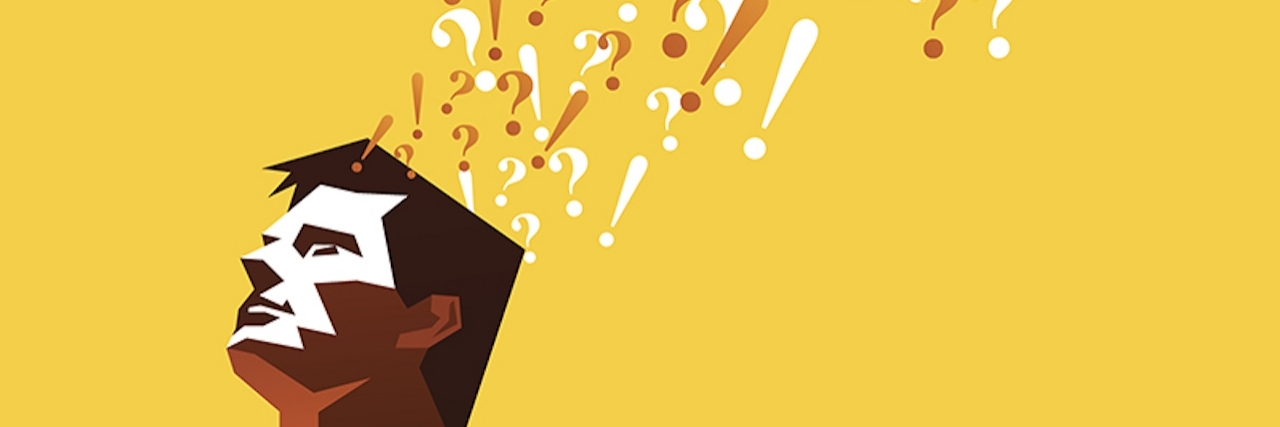Questions I'm Tired of Answering About Depression – and What I'd Rather Hear Instead
I am open about my struggle with depression. I share and answer as many questions as possible in hopes it will aid the next person. However, there are questions that I simply can’t bring myself to answer anymore. But I’ll answer them anyway, and also let you know the questions I’d rather hear.
1. “You are so happy, how can you be depressed?”
I’m an emotional chameleon, easily masking my emotions to fit in with those around me. From a young age I learned people don’t want to hear how you really feel. Negative feelings make people gravitate away, so many people with depression hide their pain behind fake smiles and giggles. This is why the “happiest” people can still die by suicide. So in most cases I’m not OK or happy, I just want to make sure you remain in a positive space.
I’d rather have you ask, “Do you need to offload?”
Often when I’m having an episode, I find it hard to speak to those I love. I’m afraid of the disappointed looks I’ll get when I tell them how I feel. By asking someone with depression share with you, you give them permission to drop the façade.
2. “How are you a Christian and depressed? Clearly you don’t pray enough.”
I remember having a conversation with my former doctor that made me feel like I was less of a Christian for having depression. I would soon learn depression can be taboo in Christianity. You don’t talk about it as it reflects badly on your faith. Many of the people I talk to about my depression make me feel weak and unchristian; almost as though God can’t love someone with a disease like mine.
I’d rather have you ask, “Did your faith give you the strength to seek help?”
Seeking help is difficult because it makes you feel like you can’t cope with everyday pressure. It took many tears and tons of prayer to master the strength to seek professional help. If anything, my faith allowed me to see the illness was bigger than I could handle on my own.
3. “Why do you need a psychiatrist?”
Although many doctors prescribe antidepressants, I found it best to see and receive treatment from a psychiatrist. Psychiatrists are like doctors and psychologists in one. They determine which psychological disorder you have, they prescribe medication best suited for this disorder, and they monitor how you respond to this medication. Psychiatrists sometimes also provide talk therapy (not to the extent of psychologist), which they use to determine the efficacy of the treatment.
I’d rather have you ask, “What is the difference between a psychologist and a psychiatrist?”
It is common to confuse the two. I had no idea there was a difference until I began treatment. Basically a psychiatrist is a medical doctor that specializes in mental health disorders. Psychiatrists can prescribe medication. Psychologists, on the other hand, do not prescribe medication.
4. “Why would you need antidepressants?”
I need antidepressants like a diabetic needs insulin. Without them I may find it almost impossible to sleep, eat, shower or leave the house. It’s that simple.
I’d rather have you ask, “How is treatment going?”
The biggest issue is not whether I need antidepressants, but rather which antidepressants will work best. Finding the correct balance of medication is not easy; it’s a trial and error process.
5. “Why are you always sick/tired if depression is ‘in your head’?”
Although depression is a mental disorder, it does manifest itself physically. A very common manifestation is terribly back pains. For months I went to a physiotherapist in order to help manage the pain. As for the fatigue, this is due to two reasons: either I sleep too much or too little. During most of my life at school I lived on less than three hours of sleep a day. During really bad spells I could go a whole week with no sleep. I began suffering from chronic fatigue, where even sleeping pills did little to help. This changed when I began to work. I would find myself wanting to sleep for hours on end. I would sleep for 12 hours or longer, and I would still be tired. This left me lethargic. I still have days when this happens. It acts as a good indicator I’m getting more depressed than usual.
I’d rather have you ask, “I heard depression can also be physically taxing. Tell me more.”
Depression means terrible back pain and headaches. It means waging war on your own body. Asking me to talk about it helps me comes to terms with it. It helps both the sufferer and their family better understand the illness.
6. “Why do you tell people you have depression? It freaks them out.”
I share my experience because I don’t want people to live with the stigma of mental disorders. I want people to be comfortable with the concept of seeing psychologists and seeking help when necessary. I want people to realize mental disorders are real, and not only for a specific section of society.
I’d rather have you ask, “Why is speaking openly about your depression important to you?”
This answer will differ depending who you ask. Some people feel the need to speak openly and freely when having an episode as it helps them cope. I am one of those people. I also speak openly about it because I don’t want people living with depression to feel alone. When I was first diagnosed, I thought I was alone in the world. Speaking about it has made me realize there is a large community willing to help every step of the way.
Depression is a serious disease that goes undetected. If you suspect those you love suffer from any mental disorder, be supportive and encourage them on their journey to recovery.
Follow this journey on Memoirs of a Virgin Prostitute.

